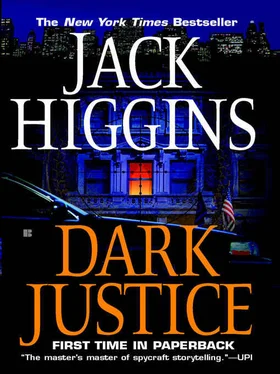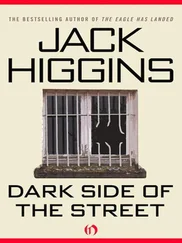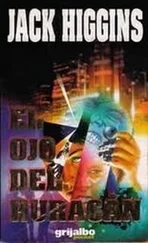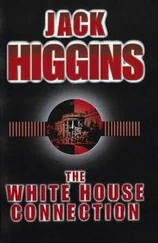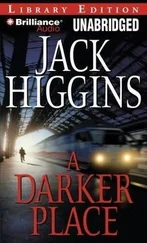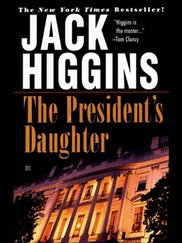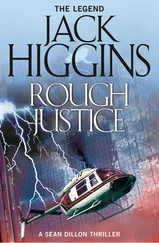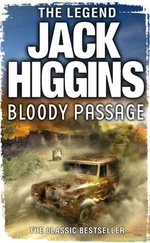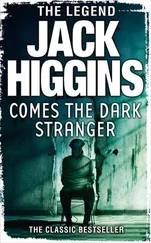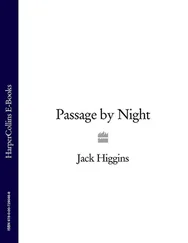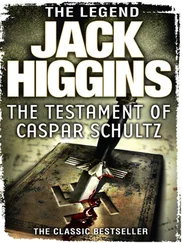“Of course, sir,” Hannah said.
“Good. On our way, then.”
They paused at the cloakroom to get coats, and it had started to rain slightly when they went out on the pavement and the Daimler coasted in.
“I’ll drop you off,” Ferguson said.
“Not me, if you don’t mind,” Dillon told him. “I feel like the walk.”
“In the rain, dear boy?” Ferguson opened the door for Hannah. “You’ll have to excuse him, Superintendent. It’s an Irish thing, the rain.”
“Sure, and your sainted mother, being a Cork woman, would have agreed with you.”
“Take care, you rogue, and stay out of trouble.”
“Always do, General.”
Dillon watched the Daimler drive off, then walked away, his collar up against the rain. He went across the entrance of the hotel and made his way down through Mayfair in the general direction of Shepherd’s Market.
That he was being followed had been obvious since leaving the ballroom. Two men, one in a reefer coat and knitted cap, the other in an anorak and baseball cap. Stupid, really, and they’d stuck out like a sore thumb among the kind of people leaving the Dorchester.
Just before reaching Shepherd’s Market, he paused on a corner to light a cigarette, then turned into a narrow side street of old town houses, fronted by Victorian spiked railings, with steps leading down to basement areas. He quickened his pace, then dashed down a flight of steps and waited in the darkness.
There was a sound of running steps. A voice said, “Where’s he gone, for Christ’s sake?”
Dillon came up the steps and stood behind them, hands in the pockets of his raincoat.
“So there you are, lads,” he said. “I was beginning to give up on you.”
“Why, you little squirt.” The man in the reefer coat turned to his friend. “Leave this to me.”
He took a length of lead pipe from one pocket. Dillon said, “Very old-fashioned.”
“Is that so?”
The man made a sudden rush, arm raised to strike down. Dillon swayed to one side, stamped against the side of one of the man’s knees so that he lurched past him, head down, and Dillon put a foot to his backside and sent him headfirst down the steps to the basement.
The man in the baseball cap took a knife from his pocket and sprang the blade. “You little bastard, I’ll show you.”
“Well, let’s be having you, then.”
The knife swung, Dillon caught hold of the wrist, turned it and the arm like a steel bar, then ran him headfirst into the railings. The man slumped to the pavement, his nose broken, blood on his mouth.
Dillon crouched beside him. “Now then, who sent you?”
“Get stuffed,” the man moaned.
“You’ve got balls, I’ll give you that.” Dillon was carrying a Walther PPK in his waistband at the rear under his jacket, and now he produced it. “But I’ve got this, and where I come from we find a bullet through the kneecap cures most ills. A crippling experience, mind you.”
“Okay.” The man put a hand up. “It was Charlie Harker put us on your case. Gave us a grand to cripple you.”
“Harker? And who would he be?”
“He runs everything on the river, from here down to the Isle of Dogs.”
“Really?” Dillon reached inside the man’s anorak, found a wad of notes and took them out. “A thousand quid from this Charlie Harker.” He shook his head. “It gives me more pleasure to leave it with you than to take it.”
“Screw you,” the man said.
“I said you have balls. Not many brains, though. Now, if I were you, I’d call an ambulance.”
He walked away, and stood on the corner thinking about it. Charlie Harker who ran everything on the river down to the Isle of Dogs? The name didn’t mean a thing to Dillon. On the other hand, he knew someone to whom it very probably did. He flagged down a passing cab, told the driver to take him to Wapping High Street and got in.
He was thinking of Harry Salter, once one of the most feared men in London, a very old-fashioned gangster, now a multimillionaire from the warehouse developments he’d built on the side of the Thames. The relationship between Harry, his nephew Billy, and Dillon and Ferguson had become close, tested in the fire on a number of occasions. If anyone knew about Harker, it would be Harry Salter.
At the same moment, Charlie Harker was in a pub called the Red Lion in Kilburn in London, sitting reading the Evening Standard and enjoying a pint. Most people stayed well clear of him, well aware that it was best for their health. A large, heavily built man in a dark suit leaned against the wall behind him. His name was Mosby and he was Harker’s minder.
Harker’s mobile went. He answered it and found Ali Selim on the other end. “Mr. Harker, I must see you.”
“What for?”
“The latest consignment to Iraq. I’ll have to delay it for a while.”
“You can’t do that, it’s all arranged. Leaving tomorrow night.”
“It’s not convenient.”
“I don’t care. The deal is five grand a head, so five heads makes it twenty-five, like we agreed, old son, and twenty-five is what I expect whether it’s on or it’s off. Does Ashimov know about this?”
“Look, be reasonable. I’ll come and see you if you like. Where are you?”
“The Red Lion, but don’t come without the cash. I’m beginning to worry about you, and that would never do.”
Selim put the phone down and sat thinking about it. It was the thing he hated most, having to deal with people like Harker, but what could he do? It was essential to keep the traffic on the move to Iraq on a regular basis, now more than ever. At least there was the money from Ashimov to keep it going.
He found a canvas bag and opened the safe in the corner of the office. There was money in there, a great deal of money, stacked neatly in bundles of fifty-pound notes. He counted out the required amount, put it in the bag and got his hat and a raincoat.
He was worried, running scared. He believed in what he was doing. His cause was just and he believed in Allah above everything, but all of a sudden, things seemed to have gotten out of hand. The Morgan thing had looked so promising, so absurdly simple with Ashimov’s support, and not only had it failed, it had brought Ferguson and his people into the equation, and this Dillon. He shuddered. A truly frightening man. And then this business of Mrs. Morgan’s so-called accident. It was a terrible business, and yet his own motives in all this had been so pure.
There was a knock on the door and the caretaker, Abdul, looked in. “Can I get you anything, Doctor?”
“No, I’ve got to go out for a while. I’ll see you later.”
He went out to the yard outside, found his Peugeot and drove away.
Dillon’s cab turned from Wapping High Street and moved along a narrow lane between warehouse developments, finally stopping outside Salter’s pub, the Dark Man, its painted sign showing a sinister individual in a black coat.
The bar was reasonably busy without being crowded, a fine old London pub, bright and cheerful, with Victorian gilt mirrors behind the mahogany bar, bottles ranged against them. Dora, the chief barmaid, sat on a stool behind the bar, smoking a cigarette.
“Why, Mr. Dillon. Haven’t seen you for a while. They’re in the corner booth.”
Which they were: Harry, his nephew Billy – at twenty-nine a hard and ruthless young man, who had killed a number of times, although usually on the side of right – and Joe Baxter and Sam Hall, Salter’s minders. They were playing cards, and Salter glanced up and smiled, genuine pleasure on his face.
“Why, Dillon, it’s good to see you. It’s been too long. You and Ferguson been up to your usual shenanigans, I assume?”
“Something like that.” Dillon called to Dora. “A large Bushmills over here, love.”
Читать дальше
Конец ознакомительного отрывка
Купить книгу
